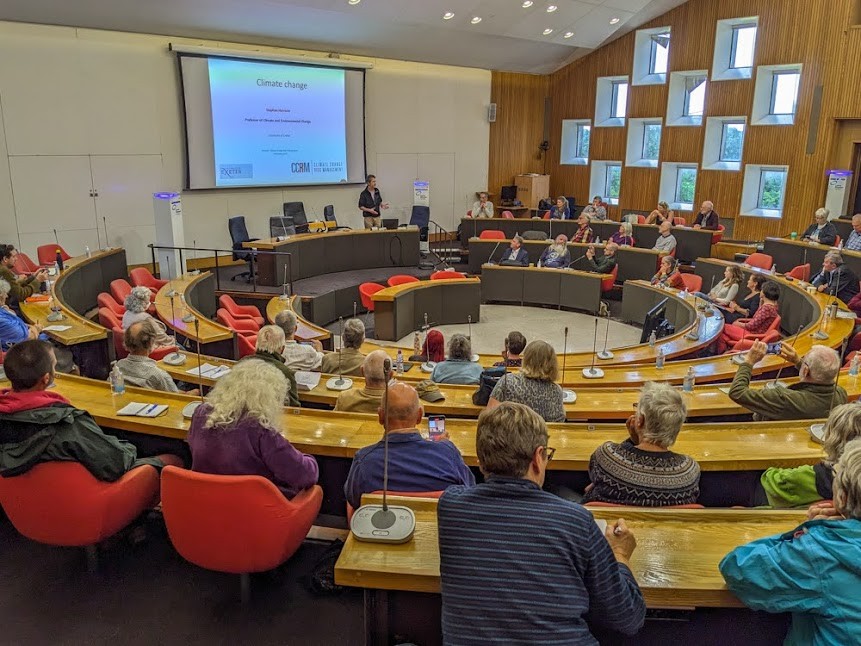The Humanity Project is a grass-roots organisation experimenting with deliberative democracy
After years at the forefront of UK climate activism, Clare Farrell concluded that without any real political power, the movement would continue to be ignored by politicians.
She likens the relationship between citizens and politicians in the UK to a “parent-child dynamic; we go outside and shout and say ‘pay me attention’ [but politicians] don’t listen.”
Farrell speaks from experience when it comes to going outside and shouting – she is a founding member of Extinction Rebellion, the group that kick-started a new era of climate protest in the UK in 2019.
Five years on, she is frustrated at the government’s lack of progress on climate goals. In Farrell’s view, if the political system isn’t responding, a new way of doing politics is needed.
So, in 2022, alongside fellow XR founder Roger Hallam, she started Humanity Project, a movement that aims to create a national network of “popular assemblies” – or “pops” – that will leave politicians with no choice but to take notice of their demands.

Photo credit: Neil Marshment
The group’s activities are in the tradition of deliberative democracy, in which groups of citizens — and not elected politicians — are empowered to make policy decisions.
Whilst Humanity Project are currently focusing on grassroots organising, one possible vision is the replacement of the House of Lords with a “House of Citizens”, according to a Humanity Project coordinator.
So far they have convened around 50 “pops” all over the country. The organisation’s facilitators work with local community groups who spread the word through outreach efforts.
At inaugural “pops”, the focus is on listening to the needs of local communities, which are then refined into an agenda. In June, Humanity Project will hold its first national assembly, an online event at which “pop” attendees picked at random from the local meetings will work on a national agenda.
Liam Killeen is a PhD researcher at Lancaster University studying the climate movement’s shift into political organisation. He sees this development as born out of a “feeling of powerlessness” within the climate movement, exacerbated by the government’s increasing intolerance of disruptive protest.
“People are scared to protest,” he says. “We’ve seen attacks on the European Court of Human Rights, [and] the 2023 Public Order Act. Liberal democratic principles are under attack.”
Killeen is a firm believer in the potential held by deliberative democracy, where citizens – not elected representatives – make decisions on policy issues.
“One thing that you witness when you go to a self-organised, deliberative democratic forum is the transformation that people in the room experience from being really disengaged to having their voice heard and appreciated,” he contends.
Humanity Project’s activities are part of a wider trend of experimentation with forms of deliberative democracy. The UK government held a national climate assembly in 2021, and dozens more councils have held their own citizens’ assemblies, often specifically on climate issues.
Killeen is sceptical of the way citizens’ assemblies have been used so far by government bodies. “What we’ve seen [with] citizens’ assemblies around the UK is that they’ll be instrumentalised,” he says. “People pretend to be enamoured with the idea of deliberative democracy. But when push comes to shove, councils only really want recommendations that align with their current strategy.”
Farrell similarly says that the 2021 national climate assembly was ineffective because the government set the agenda: “They retain the power, so they can have the assembly and say, ‘You’ve all had a chat and we’ve listened to you and now we can ignore it if we want to’.”
Whilst its precise contours are still being worked out, Humanity Project’s vision is more radical. It would at minimum involve deliberative bodies having independent political power. “Without any sort of material power for the assembly to assert itself into the political space, it’s just a fancy focus group,” says Farrell. “We want to build up power, for people to be self-organised,” she adds.
It remains to be seen whether Humanity Project will be able to mobilise people on the scale managed by XR, or whether the political establishment will be any more amenable to this new form of activism – the group’s emphasis on extra-parliamentary organisation leaves them open to charges that they are encouraging disengagement from electoral politics. Luke Akehurst, a member of the Labour Party’s National Executive Committee, cautions against “the urge to have non-parliamentary forms of democracy.” “I would urge people to not lose faith with the conventional democratic process,” he adds.
Killeen is clear however that groups like Humanity Project have the potential to invigorate our political process: “[It’s not that] either you act within the current democratic institutions, and therefore you’re democratic, or you act outside, and therefore you’re not.”
Feature image: A Humanity Project “pop” in Cornwall. Photo credit: Neil Marshment

